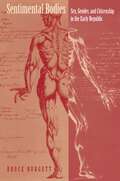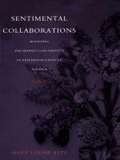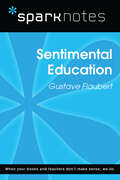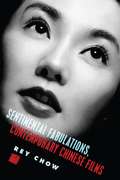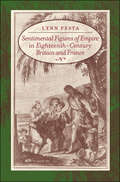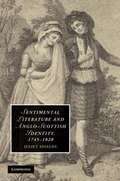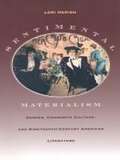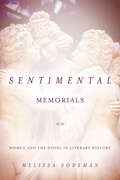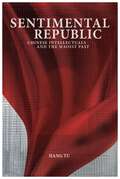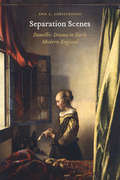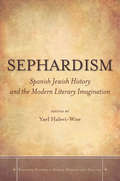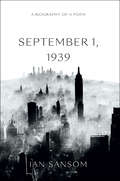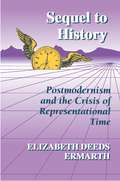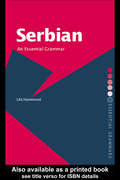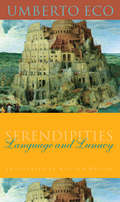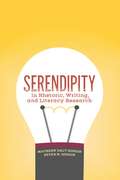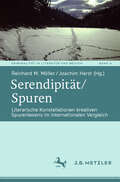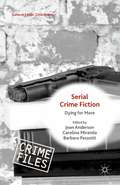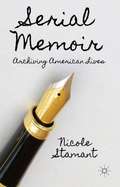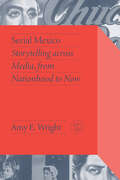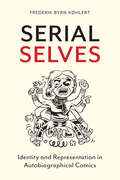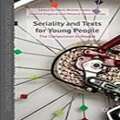- Table View
- List View
Sentimental Bodies: Sex, Gender, and Citizenship in the Early Republic
by Bruce BurgettSentimentalism, sex, the construction of the modern body, and the origins of American liberalism all come under scrutiny in this rich discussion of political life in the early republic. Here Bruce Burgett enters into debates over the "public sphere," a concept introduced by Jurgen Habermas that has led theorists to grapple with such polarities as public and private, polity and personality, citizenship and subjection. With the literary public sphere as his primary focus, Burgett sets out to challenge the Enlightenment opposition of reason and sentiment as the fundamental grid for understanding American political culture. Drawing on texts ranging from George Washington's "Farewell Address" and Charles Brockden Brown's Clara Howard to Hannah Foster's The Coquette and Harriet Jacobs's Incidents in the Life of a Slave Girl, Burgett shows that the sentimental literary culture of the period relied on readers' affective, passionate, and embodied responses to fictive characters and situations in order to produce political effects. As such, sentimentalism located readers' bodies both as prepolitical sources of personal authenticity and as public sites of political contestation. Going beyond an account of the public sphere as a realm to which only some have full access, Burgett reveals that the formation of the body and sexual subjectivity is crucial to the very construction of that sphere. By exploring and destabilizing the longstanding distinction between public and private life, this book raises questions central to any democratic political culture.
Sentimental Collaborations: Mourning and Middle-Class Identity in Nineteenth-Century America
by Mary Louise KeteDuring the 1992 Democratic Convention and again while delivering Harvard University's commencement address two years later, Vice President Al Gore shared with his audience a story that showed the effect of sentiment in his life. In telling how an accident involving his son had provided him with a revelation concerning the compassion of others, Gore effectively reconstructed himself as a typical, middle-class American for whom sympathy can lead to salvation. This contemporary reiteration of mid-nineteenth-century American sentimental discourse proves to be a fruitful point of departure for Mary Louise Kete's argument that sentimentality has been an important and recurring form of cultural narrative that has helped to shape middle-class American life. Many scholars have written about the sentimental novel as a primarily female genre and have stressed its negative ideological aspects. Kete finds that in fact many men--from writers to politicians--participated in nineteenth-century sentimental culture. Importantly, she also recovers the utopian dimension of the phenomenon, arguing that literary sentimentality, specifically in the form of poetry, is the written trace of a broad cultural discourse that Kete calls "sentimental collaboration"--an exchange of sympathy in the form of gifts that establishes common cultural or intellectual ground. Kete reads the work of Ralph Waldo Emerson, Henry Wadsworth Longfellow, Mark Twain, Harriet Beecher Stowe, and Lydia Huntley Sigourney with an eye toward the deployment of sentimentality for the creation of Americanism, as well as for political and abolitionist ends. Finally, she locates the origins of sentimental collaboration in the activities of ordinary people who participated in mourning rituals--writing poetry, condolence letters, or epitaphs--to ease their personal grief. Sentimental Collaborations significantly advances prevailing scholarship on Romanticism, antebellum culture, and the formation of the American middle class. It will be of interest to scholars of American studies, American literature, cultural studies, and women's studies.
Sentimental Education (SparkNotes Literature Guide Series)
by SparkNotesSentimental Education (SparkNotes Literature Guide) by Gustave Flaubert Making the reading experience fun!Created by Harvard students for students everywhere, SparkNotes is a new breed of study guide: smarter, better, faster. Geared to what today's students need to know, SparkNotes provide:Chapter-by-chapter analysisExplanations of key themes, motifs, and symbolsA review quiz and essay topicsLively and accessible, these guides are perfect for late-night studying and writing papers.
Sentimental Fabulations, Contemporary Chinese Films: Attachment in the Age of Global Visibility (Film and Culture Series)
by Rey ChowWhat is the sentimental? How can we understand it by way of the visual and narrative modes of signification specific to cinema and through the manners of social interaction and collective imagining specific to a particular culture in transition? What can the sentimental tell us about the precarious foundations of human coexistence in this age of globalization? Rey Chow explores these questions through nine contemporary Chinese directors (Chen Kaige, Wong Kar-wai, Zhang Yimou, Ann Hui, Peter Chan, Wayne Wang, Ang Lee, Li Yang, and Tsai Ming-liang) whose accomplishments have become historic events in world cinema. Approaching their works from multiple perspectives, including the question of origins, nostalgia, the everyday, feminine "psychic interiority," commodification, biopolitics, migration, education, homosexuality, kinship, and incest, and concluding with an account of the Chinese films' epistemic affinity with the Hollywood blockbuster Brokeback Mountain, Chow proposes that the sentimental is a discursive constellation traversing affect, time, identity, and social mores, a constellation whose contours tends to morph under different historical circumstances and in different genres and media. In contemporary Chinese films, she argues, the sentimental consistently takes the form not of revolution but of compromise, not of radical departure but of moderation, endurance, and accommodation. By naming these films sentimental fabulations-screen artifacts of cultural becoming with irreducible aesthetic, conceptual, and speculative logics of their own-Chow presents Chinese cinema first and foremost as an invitation to the pleasures and challenges of critical thinking.
Sentimental Figures of Empire in Eighteenth-Century Britain and France
by Lynn FestaIn this ambitious and original study, Lynn Festa examines how and why sentimental fiction became one of the primary ways of representing British and French relations with colonial populations in the eighteenth century. Drawing from novels, poetry, travel narratives, commerce manuals, and philosophical writings, Festa shows how sentimentality shaped communal and personal assertions of identity in an age of empire.Read in isolation, sentimental texts can be made to tell a simple story about the emergence of the modern psychological self. Placed in conversation with empire, however, sentimentality invites both psychological and cultural readings of the encounter between self and other. Sentimental texts, Festa claims, enabled readers to create powerful imagined relations to distant people. Yet these emotional bonds simultaneously threatened the boundaries between self and other, civilized and savage, colonizer and colonized. Festa argues that sentimental tropes and figures allowed readers to feel for others, while maintaining the particularity of the individual self. Sentimental identification thus operated as a form of differentiation as well as consolidation.Festa contends that global reach increasingly outstripped imaginative grasp during this era. Sentimentality became an important tool for writers on empire, allowing conquest to be portrayed as commerce and scenes of violence and exploitation to be converted into displays of benevolence and pity. Above all, sentimental texts used emotion as an important form of social and cultural distinction, as the attribution of sentience and feeling helped to define who would be recognized as human.
Sentimental Literature and Anglo-Scottish Identity, 1745-1820
by Juliet ShieldsWhat did it mean to be British, and more specifically to feel British, in the century following the parliamentary union of Scotland and England? Juliet Shields departs from recent accounts of the Romantic emergence of nationalism by recovering the terms in which eighteenth- and early nineteenth-century writers understood nationhood. She argues that in the wake of the turmoil surrounding the Union, Scottish writers appealed to sentiment, or refined feeling, to imagine the nation as a community. They sought to transform a Great Britain united by political and economic interests into one united by shared sympathies, even while they used the gendered and racial connotations of sentiment to differentiate sharply between Scottish, English, and British identities. By moving Scotland from the margins to the center of literary history, the book explores how sentiment shaped both the development of British identity and the literature within which writers responded creatively to the idea of nationhood.
Sentimental Materialism: Gender, Commodity Culture, and Nineteenth-Century American Literature
by Lori MerishIn Sentimental Materialism Lori Merish considers the intricate relationship between consumption and womanhood in the late eighteenth and nineteenth centuries. Taking as her starting point a diversity of cultural artifacts--from domestic fiction and philosophical treatises to advice literature and cigars--Merish explores the symbolic functions they served and finds that consumption evolved into a form of personal expressiveness that indicated not only a woman's wealth and taste but also her race, class, morality, and civic values. The discursive production of this new subjectivity--the feminine consumer--was remarkably influential, helping to shape American capitalism, culture, and nation building.The phenomenon of female consumption was capitalism's complement to male production: It created what Merish calls the "Other Protestant Ethic,"a feminine and sentimental counterpart to Max Weber's ethic of hard work, economic rationality, and self-control. In addition, driven by the culture's effort to civilize the "cannibalistic" practices of ethnic, class, and national otherness, appropriate female consumerism, marked by taste and refinement, identified certain women and their families as proper citizens of the United States. The public nature of consumption, however, had curiously conflicting effects: While the achievement of cultured material circumstances facilitated women's civic agency, it also reinforced stereotypes of domestic womanhood.Sentimental Materialism's inquiry into middle-class consumption and accompanying ideals of womanhood will appeal to readers in a variety of disciplines, including American studies, cultural studies, feminist theory, and cultural history.
Sentimental Memorials: Women and the Novel in Literary History
by Melissa SodemanDuring the later eighteenth century, changes in the meaning and status of literature left popular sentimental novels stranded on the margins of literary history. While critics no longer dismiss or ignore these works, recent reassessments have emphasized their interventions in various political and cultural debates rather than their literary significance. Sentimental Memorials, by contrast, argues that sentimental novels gave the women who wrote them a means of clarifying, protesting, and finally memorializing the historical conditions under which they wrote. As women writers successfully navigated the professional marketplace but struggled to position their works among more lasting literary monuments, their novels reflect on what the elevation of literature would mean for women's literary reputations. Drawing together the history of the novel, women's literary history, and book history, Melissa Sodeman revisits the critical frameworks through which we have understood the history of literature. Novels by Sophia Lee, Ann Radcliffe, Charlotte Smith, and Mary Robinson, she argues, offer ways of rethinking some of the signal literary developments of this period, from emerging notions of genius and originality to the rise of an English canon. And in Sodeman's analysis, novels long seen as insufficiently literary acquire formal and self-historicizing importance.
Sentimental Opera
by Stefano CastelvecchiSentimental Opera is a study of the relationship between opera and two major phenomena of eighteenth-century European culture - the cult of sensibility and the emergence of bourgeois drama. A thorough examination of social and cultural contexts helps to explain the success of operas such as Paisiello's Nina as well as the extreme emotional reactions of their audiences. Like their counterparts in drama, literature and painting, these works brought to the fore serious contemporary problems including the widespread execution of deserters, the treatment of the insane, and anxieties relative to social and familial roles. They also developed a specifically operatic version of the dominant language of sensibility. This wide-ranging study involves such major cultural figures as Goldoni, Diderot and Mozart, while refining our understanding of the theatrical genre system of their time.
Sentimental Republic: Chinese Intellectuals and the Maoist Past (Harvard Contemporary China Series #21)
by Hang TuHow does emotion shape the landscape of public intellectual debate? In Sentimental Republic, Hang Tu proposes emotion as a new critical framework to approach a post-Mao cultural controversy. As it entered a period of market reform, China did not turn away from revolutionary sentiments. Rather, the post-Mao period experienced a surge of emotionally charged debates about red legacies, ranging from the anguished denunciations of Maoist violence to the elegiac remembrances of socialist egalitarianism.Sentimental Republic chronicles forty years (1978–2018) of bitter cultural wars about the Maoist past. It analyzes how the four major intellectual clusters in contemporary China—liberals, the left, cultural conservatives, and nationalists—debated Mao’s revolutionary legacies in light of the postsocialist transition. Should the Chinese condemn revolutionary violence and “bid farewell to socialism”? Or would a return to revolution foster alternative visions of China’s future path? Tu probes the nexus of literature, thought, and memory, bringing to light the dynamic moral sentiments and emotional excess at work in these post-Mao ideological contentions. By analyzing how rival intellectual camps stirred up melancholy, guilt, anger, and resentment, Tu argues that the polemics surrounding the country’s past cannot be properly understood without reading the emotional trajectories of the post-Mao intelligentsia.
Separation Scenes: Domestic Drama in Early Modern England (Early Modern Cultural Studies)
by Ann C. ChristensenThis analysis of five exemplary domestic plays—the anonymous Arden of Faversham and A Warning for Fair Women (1590s), Thomas Heywood’s A Woman Killed with Kindness (1607), Thomas Middleton’s Women Beware Women (ca. 1613), and Walter Mountfort’s The Launching of the Mary, or The Seaman’s Honest Wife (1632)—offers a new approach to the emerging ideology of the private and public, or what Ann C. Christensen terms “the tragedy of the separate spheres.” Feminist scholarship has identified the fruitful gaps between theories and practices of household government in early modern Europe, while work on the global Renaissance attends to commercial expansion, cross-cultural encounters, and colonial settlements. Separation Scenes brings these critical concerns together to expose the intimate and disruptive relationships between the domestic culture and business culture of early modern England. Separation Scenes argues that domestic plays make the absence of husbands for business the subject of tragedy by focusing not on where men traveled but on whom and what they left behind. Elements that critics have rightly associated with domestic tragedy—adultery, sensational murders, and the lavishly articulated operations of domestic life—define this world, which, Christensen argues, was equally shaped by the absence of husbands. Her interpretations of these domestic plays invite us to historicize and further complicate the seemingly universal binary between a feminine “private sphere” and a masculine “public sphere.” Separation Scenes demonstrates how domestic drama played an active, dynamic, and critical role in deliberating the costs of commercial travel as it disrupted domestic conduct and prompted realignments within the home.
Sephardism: Spanish Jewish History and the Modern Literary Imagination
by Yael Halevi-WiseIn this book, Sephardism is defined not as an expression of Sephardic identity but as a politicized literary metaphor. Since the nineteenth century, this metaphor has occurred with extraordinary frequency in works by authors from a variety of ethnicities, religions, and nationalities in Europe, the Americas, North Africa, Israel, and even India. Sephardismasks why Gentile and Jewish writers and cultural figures have chosen to draw upon the medieval Sephardic experience to express their concerns about dissidents and minorities in modern nations? To what extent does their use of Sephardism overlap with other politicized discourses such as orientalism, hispanism, and medievalism, which also emerged from a clash between authoritarian, progressive, and romantic ideologies? This book brings a new approach to Sephardic Studies by situating it at a crossroads between Jewish Studies and Hispanic Studies in ways that enhance our appreciation of how historical fiction and political history have shaped, and were shaped by, historical attitudes toward Jews and their representation.
September 1, 1939: A Biography of a Poem
by Ian SansomOne poet, his poem, New York City, and a world on the verge of change.W. H. Auden, a wunderkind, a victim-beneficiary of a literary cult of personality, became a scapegoat and a poet-expatriate largely excluded from British literary history because he left. And his poem, “September 1, 1939,” was his most famous and celebrated, yet one which he tried to rewrite and disown and which has enjoyed—or been condemned—to a tragic and unexpected afterlife.These are the contributing forces underlying Ian Sansom’s work excavating the man and his most celebrated piece of literature. But Sansom’s book is also about New York City: an island, an emblem of the Future, magnificent, provisional, seamy, and in 1939—about to emerge as the defining twentieth-century cosmopolis, the capital of the world.And so it is also about a world at a point of change—about 1939, and about our own Age of Anxiety, about the aftermath of September 11, when many American newspapers reprinted Auden’s poem in its entirety on their editorial pages.More than a work of literary criticism or literary biography, this is a record of why and how we create and respond to great poetry.
Sequel to History: Postmodernism and the Crisis of Representational Time
by Elizabeth Deeds ErmarthSequel to History offers a comprehensive definition of postmodernism as a reformation of time. Elizabeth Deeds Ermarth uses a diversified theoretical approach drawing on post-structuralism, feminism, new historicism, and twentieth-century science to demonstrate the crisis of our dominant idea of history and its dissolution in the rhythmic time of postmodernism. She enlarges this definition in discussions of several crises of cultural identity: the crisis of the object, the crisis of the subject, and the crisis of the sign. Finally, she explores the relation between language and time in post-modernism, proposing an arresting theory of her own about the rhythmic nature of postmodern temporality. <P><P>Because the postmodern construction of time appears so clearly in narrative writing, each part of this work is punctuated by a "rhythm section" on a postmodern narrative (Robbe-Grillet's Jealousy, Cortezar's Hopscotch, and Nabokov's Ada); these extended readings provide concrete illustrations of Ermarth's theoretical positions. As in her critically acclaimed Realism and Consensus in the English Novel, Ermarth ranges across disciplines from anthropology and the visual arts to philosophy and history. For its interdisciplinary character and its lucid definition of postmodernism, Sequel to History will appeal to all those interested in the humanities.
Sequel: A Handbook for the Critical Analysis of Literature
by Elizabeth Schmuhl Richard C. Guches Meredith Mayberry Jill PeekTextbook for the study and analysis of poetry, fiction, and drama
Serbian: An Essential Grammar (Routledge Essential Grammars)
by Lila HammondSerbian: An Essential Grammar is an up-to-date and practical reference guide to the most important aspects of Serbian as used by contemporary native speakers of the language. Refreshingly jargon free, it presents an accessible description of the language, focusing on the real patterns of use today. A reference source for the learner and user of Serbian irrespective of level, it sets out the complexities of the language in short, readable sections. Features of this Grammar include: * use of Cyrillic and Latin script examples throughout* a cultural section on the language and its dialects* clear and detailed explanations of simple and complex grammatical concepts* detailed contents list and index for easy reference. Well-presented and easy to use, Serbian: An Essential Grammar is ideal either for independent study or for students in schools, colleges, universities and adult education.
Serendipities
by Umberto Eco William WeaverIn a careful unraveling of the fabulous and the false, Eco shows us how serendipities----unanticipated truths----often spring from mistaken ideas. Eco uncovers layers of mistakes that have shaped human history, such as Columbus's assumption that the world was much smaller than it is, leading him to seek out a quick route to the East via the West and thus fortuitously "discovering" America.
Serendipities: Language and Lunacy (Italian Academy Lectures)
by Umberto EcoBest-selling author Umberto Eco's latest work unlocks the riddles of history in an exploration of the "linguistics of the lunatic," stories told by scholars, scientists, poets, fanatics, and ordinary people in order to make sense of the world. Exploring the "Force of the False," Eco uncovers layers of mistakes that have shaped human history, such as Columbus's assumption that the world was much smaller than it is, leading him to seek out a quick route to the East via the West and thus fortuitously "discovering" America. The fictions that grew up around the cults of the Rosicrucians and Knights Templar were the result of a letter from a mysterious "Prester John"—undoubtedly a hoax—that provided fertile ground for a series of delusions and conspiracy theories based on religious, ethnic, and racial prejudices. While some false tales produce new knowledge (like Columbus's discovery of America) and others create nothing but horror and shame (the Rosicrucian story wound up fueling European anti-Semitism) they are all powerfully persuasive.In a careful unraveling of the fabulous and the false, Eco shows us how serendipities—unanticipated truths—often spring from mistaken ideas. From Leibniz's belief that the I Ching illustrated the principles of calculus to Marco Polo's mistaking a rhinoceros for a unicorn, Eco tours the labyrinth of intellectual history, illuminating the ways in which we project the familiar onto the strange.Eco uncovers a rich history of linguistic endeavor—much of it ill-conceived—that sought to "heal the wound of Babel." Through the Middle Ages and the Renaissance, Greek, Hebrew, Chinese, and Egyptian were alternately proclaimed as the first language that God gave to Adam, while—in keeping with the colonial climate of the time—the complex language of the Amerindians in Mexico was viewed as crude and diabolical. In closing, Eco considers the erroneous notion of linguistic perfection and shrewdly observes that the dangers we face lie not in the rules we use to interpret other cultures but in our insistence on making these rules absolute.With the startling combination of erudition and wit, bewildering anecdotes and scholarly rigor that are Eco's hallmarks, Serendipities is sure to entertain and enlighten any reader with a passion for the curious history of languages and ideas.
Serendipity in Rhetoric, Writing, and Literacy Research
by Maureen Daly Goggin and Peter N. GogginIn the course of research, most scholars have known moments of surprise, catastrophe, or good fortune, though they seldom refer to these occurrences in reports or discuss them with students. Serendipity in Rhetoric, Writing, and Literacy Research reveals the different kinds of work scholars, particularly those in rhetoric, writing, and literacy, need to do in order to recognize a serendipitous discovery or a missed opportunity. In published scholarship and research, the path toward discovery seems clean and direct. The dead ends, backtrackings, start-overs, and stumbles that occur throughout the research process are elided, and seems that the researchers started at point A and arrived safely and neatly at point B without incident, as if by magic. The path, however, is never truly clear and straight. Research and writing is messy. Serendipity in Rhetoric, Writing, and Literacy Research features chapters from twenty-three writing scholars who have experienced moments of serendipity in their own work—not by magic or pure chance but through openness and active waiting, which offer an opportunity to prepare the mind. Serendipity in Rhetoric, Writing, and Literacy Research illustrates the reality of doing research: there is no reliable prescription or one-size-fits-all manual, but success can be found with focused dedication and an open mind. Contributors: Ellen Barton, Zachary C. Beare, Lynn Z. Bloom, Jennifer Clary-Lemon, Caren Wakerman Converse, Gale Coskan-Johnson, Kim Donehower, Bill Endres, Shirley E. Faulkner-Springfield, Lynée Lewis Gaillet, Brad Gyori, Judy Holiday, Gesa E. Kirsch, Lori Ostergaard, Doreen Piano, Liz Rohan, Ryan Skinnell, Patricia Wilde, Daniel Wuebben
Serendipität/Spuren: Literarische Konstellationen kreativen Spurenlesens im internationalen Vergleich (Kriminalität in Literatur und Medien #4)
by Reinhard M. Möller Joachim HarstWelche Bedeutung hat Serendipität als Modell ungeplanter, ungesuchter und zufallsgespeister Kreativität für Darstellungen und Praktiken des Spurenlesens? Diese Frage erkundet der vorliegende Band ausgehend von Carlo Ginzburgs Begriff des „Indizienparadigmas“, der Spurenlesen und Zeichendeuten als grundlegende Kulturpraktiken ausweist, einerseits und dem von Horace Walpole 1754 ,erfundenen‘ „serendipity“-Konzept andererseits, das im 20. und 21. Jahrhundert eine stark zunehmende theoretische Konjunktur erfahren hat. Vor diesem Hintergrund untersuchen die Beiträge Schnittpunkte von Spuren und Serendipität in der internationalen (Kriminal-)Literatur sowie in forensischen Ästhetiken und in TV-Serien. Darstellungen des Spurenlesens aus diversen historischen und kulturellen Kontexten werden verglichen, um so die Frage zu bearbeiten, inwiefern Akzentuierungen des Serendipitären alternative Ausprägungen der detektivischen Ratio hervorbringen.
Serial Crime Fiction: Dying for More (Crime Files)
by Jean AndersonSerial Crime Fiction is the first book to focus explicitly on the complexities of crime fiction seriality. Covering definitions and development of the serial form, implications of the setting, and marketing of the series, it studies authors such as Doyle, Sayers, Paretsky, Ellroy, Marklund, Camilleri, Borges, across print, film and television.
Serial Memoir
by Nicole StamantSerial Memoir chronicles the phenomenon of seriality in memoir, a transition in life writing toward repeated acts of self-representation in the later twentieth century. Such a shift demonstrates a new way to understand and represent constantly-shifting subjectivities and their ambivalent relationship to the concept and structure of the archive.
Serial Mexico: Storytelling Across Media, From Nationhood to Now (Critical Mexican Studies)
by Amy E. WrightNo book until now has tied in two centuries of Mexican serial narratives—tales of glory, of fame, and of epic characters, grounded in oral folklore—with their subsequent retelling in comics, radio, and television soap operas. Wright&’s multidisciplinary Serial Mexico delves into this storytelling tradition: examining the nostalgic tales reimagined in novelas, radionovelas, telenovelas and onwards, and examining the foundational figures who have been woven into society. This panorama shows the Mexican experience of storytelling from the country&’s early days until now, showcasing protagonists that mock authority, make light of hierarchy, and embrace the hybridity and mestizaje of Mexico. These tales reflect on and respond to crucial cultural concerns such as family, patriarchy, gender roles, racial mixing, urbanization, modernization, and political idealism. Serial Mexico thus examines how serialized storytelling&’s melodrama and sensationalism reveals key political and cultural messaging. In a detailed yet accessible style, Wright describes how these stories have continued to morph with current times&’ concerns and social media. Will tropes and traditions carry on in new and reimagined serial storytelling forms? Only time will tell. Stay tuned for the next episode.
Serial Selves: Identity and Representation in Autobiographical Comics
by Frederik KøhlertAutobiography is one of the most dynamic and quickly-growing genres in contemporary comics and graphic narratives. In Serial Selves, Frederik Byrn Køhlert examines the genre’s potential for representing lives and perspectives that have been socially marginalized or excluded. With a focus on the comics form’s ability to produce alternative and challenging autobiographical narratives, thematic chapters investigate the work of artists writing from perspectives of marginality including gender, sexuality, disability, and race, as well as trauma. Interdisciplinary in scope and attuned to theories and methods from both literary and visual studies, the book provides detailed formal analysis to show that the highly personal and hand-drawn aesthetics of comics can help artists push against established narrative and visual conventions, and in the process invent new ways of seeing and being seen. As the first comparative study of how comics artists from a wide range of backgrounds use the form to write and draw themselves into cultural visibility, Serial Selves will be of interest to anyone interested in the current boom in autobiographical comics, as well as issues of representation in comics and visual culture more broadly.
Seriality and Texts for Young People
by Mavis Reimer Nyala Ali Deanna England Melanie Dennis UnrauSeriality and Texts for Young People is a collection of thirteen scholarly essays about series and serial texts directed to children and youth, each of which begins from the premise that a basic principle of seriality is repetition.
